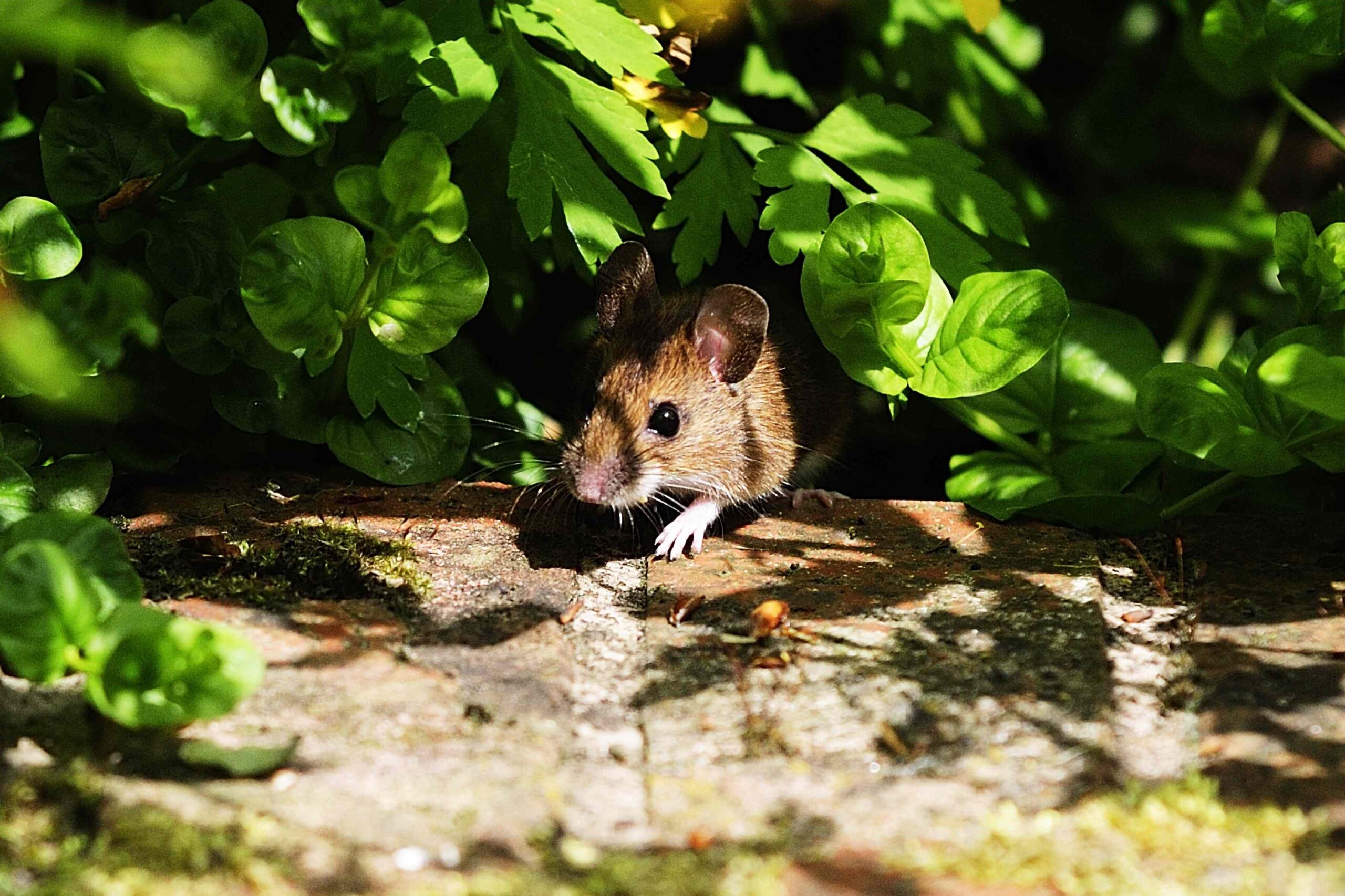Key Points
- Remove food sources from your yard, like ripe produce, compost, bird seed, and pet food. Eliminate water sources like bird baths and leaky spigots.
- Field mice love cover to hide from predators, so keep your lawn mowed and clutter-free.
- Traps are very effective, but make sure they are humane, instant kill traps or catch-and-release models.
Field mice are clever and resourceful creatures. For this reason, eliminating them from your yard (and in turn, your home) requires a multifaceted approach.
We interviewed three wildlife and pest control experts to learn a variety of humane tips for making the area surrounding your home a less desirable place for mice to roam, and here are their best tips.
Meet the Experts
- David Mizejewski is a naturalist with the National Wildlife Federation.
- Meg Pearson is a wildlife training manager at Critter Control.
- Blair Calder is the founder of Automatic Trap Company, which produces humane-kill mouse traps.
Are Field Mice Harmful to Your Yard?
If you have field mice in your yard, the good news is that you actually don’t need to totally eradicate them. They are unlikely to cause irreversible damage to your yard.
Your main goal should be to deter them from entering your home since they can carry diseases harmful to humans, so focus on making the portion of your yard directly bordering your home a less ideal habitat for them.
According to naturalist David Mizejewski, “field mice” is a general term that could apply to any small, wild rodent species, but typically mice and voles. These critters look very similar, but voles have shorter tails than mice.
“Both types of rodents are native wildlife that belong in the landscape and play an important ecological role as a food source for other wildlife, such as owls and foxes, and as seed dispersers,” he says.
Mice aren’t harmful to your landscaping plants, but voles may munch on them when food is scarce in the winter. Voles can also dig tunnels in your yard that damage shrub and tree root systems, but this rarely destroys these plants entirely.
Want more gardening tips? Sign up for our free gardening newsletter for our best growing tips, troubleshooting hacks, and more!
Clear Out the Food Sources (Where You Can)
If you truly want to get rid of the food sources for your field mice, Mizejewski says you’d have to remove all of your yard’s vegetation and pave over everything, which he obviously does not recommend. But there are some other food sources you can focus on removing to make your lawn a less ideal habitat.
Since mice are foraging creatures always on the lookout for food, wildlife training manager Meg Pearson suggests keeping your yard free of the following:
- Readily accessible food waste
- Bird seed
- Pet food
Harvest Your Garden Quickly
On the topic of food sources, a bountiful garden is a great one for field mice. But you don’t need to give up the hobby to keep mice away.
Instead, pest control expert Blair Calder suggests harvesting your fruit and veggies as quickly as possible. You can even pick certain produce before it’s fully ripe. For example, tomatoes will continue to ripen off the vine.
Keep Your Lawn Mowed
Andrija Nikolic / Getty Images
Field mice love a good field (it’s in their name after all). Tall, lush grass is not only a great food source for field mice, but it also provides coverage from predators. That’s why keeping your lawn tidy helps get rid of field mice in your yard.
“Small animals like mice thrive in overgrown, unkempt lawns,” Pearson says. “So be sure to regularly mow your grass and keep your yard clear of sticks, leaves, and other sorts of brush that provide cover for foraging mice.”
Clear the Clutter
Yard debris isn’t the only thing mice like to hide inside. Junk piles are wonderful places for mice to escape from predators and nest.
“Yard clutter is like a magnet for field mice,” Calder says. “Try taking anything you don’t need to the transfer station or dump. And for items you want to keep but don’t want indoors, secure them on shelves in your garage.”
Plant Peppermint
The Spruce / Meg MacDonald
Mice have a strong sense of smell, and they aren’t a fan of the scent of peppermint (the same goes for mosquitoes). You can leverage their hatred by planting mint along the perimeter of your home.
Just keep in mind that mint can get pretty invasive, so you’ll need to keep it well-managed. You can always grow it in containers if you’re concerned.
Protect Landscape Beds With Fine Metal Mesh
To make landscape beds less desirable for voles to munch on or dig tunnels through, Mizejewski suggests installing fine mesh metal hardware cloth underneath and around them.
You can also wrap it around the bark of your most prized trees and shrubs to prevent gnawing.
Use an Ultrasonic Noise Generator
If you’re looking for some temporary relief from a field mouse issue, plugging in some ultrasonic noise generators outside may help. In theory, these work by emitting a noise that humans can’t hear, but that is irritating to field mice. However, the key is to remember that this is only a short-term solution, if at all effective.
“Once the mice realize they are not in any actual danger and get used to these repellents, they will likely return to your property to look for food,” Pearson says.
Eliminate Water Sources
Dave Fimbres Photography / Getty Images
Field mice need water to survive, so Calder points out that leaky hoses and water features like fountains and bird baths can attract them. Consider removing these water sources and hiring a plumber to address any dripping outdoor spigots.
Plant a Native Wildflower Garden
This tip seems a bit counterintuitive, but Mizejewski says a great way to keep field mice from seeking food and cover in your home or ornamental plants is to provide them and their predators with an ideal habitat. Pick a portion of your yard located the farthest from your home, and plant a native wildflower garden.
“Native plants will provide natural food sources for these small mammals, along with songbirds, bees, butterflies, other pollinators, and a host of other local wildlife, including their predators, which will keep the populations of mice and voles in check naturally,” he says.
Set Humane Traps
If you’ve exhausted all other resources, you may need to set a few traps to curb a field mouse problem in your yard. When setting out traps, choose catch-and-release models or ones that kill the mice instantly. Sticky traps cause mice prolonged suffering.
And if you want to do a little good for the environment without having to intervene, Calder says to set an instant kill trap that’s self-resetting and allows ravens, owls, foxes, and raccoons to scavenge the dead mouse.











